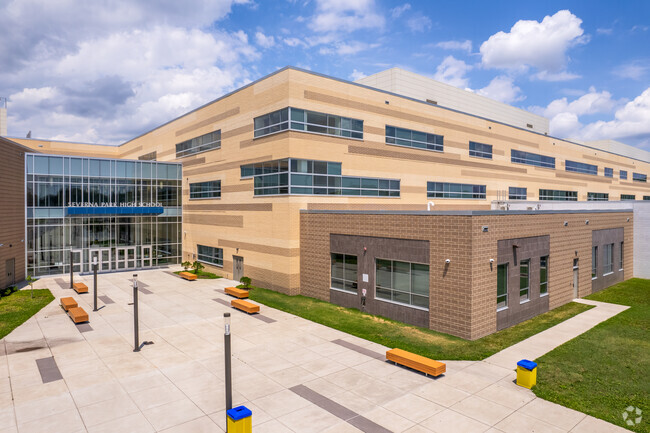Join Us: Occasions and Initiatives to Save Temecula Schools
Join Us: Occasions and Initiatives to Save Temecula Schools
Blog Article
The Influence of School Environments on Academic Success and Personal Wellness
The design of instructional areas, consisting of natural lighting and ergonomic furniture, can enhance trainees' focus and convenience. Just how can schools strategically improve these elements to better sustain their pupils?
Physical Design and Design
Just how does the physical design and layout of an institution impact academic success? The setup and aesthetic of a school environment can considerably affect students' knowing results. A properly designed college design promotes ease of movement, decreases distractions, and promotes a feeling of safety and security and belonging. As an example, vast passages and clearly significant locations assist in smooth transitions in between classes, minimizing lateness and disruption. Furthermore, strategically put common areas encourage social interactions, which are essential for emotional and social advancement.
Natural illumination and reliable air flow systems are critical in improving cognitive feature and minimizing absence. Researches have revealed that class with ample natural light improve pupil concentration and lower sensations of drowsiness. Ergonomic furniture tailored to pupils' needs can stop physical discomfort, enabling for extended emphasis and interaction in academic tasks.
Accessibility to exterior rooms and visually pleasing surroundings likewise play an essential function - Save Temecula Schools. Eco-friendly areas and properly maintained school premises supply chances for workout and psychological relaxation, both of which are very important for keeping high degrees of academic efficiency. Essentially, a thoughtfully designed physical environment can act as a stimulant for scholastic quality, cultivating an ambience that supports both training and knowing
Class Atmosphere
An atmosphere that promotes a sense of safety and security, inclusivity, and mutual regard motivates pupils to engage even more proactively in their understanding procedures. The atmosphere of a class, consisting of aspects such as lights, sound levels, and seating setups, can considerably impact student concentration and inspiration.
Furthermore, the classroom ambience need to sustain a culture of collaboration and open interaction. They are more likely to engage deeply with the material and create vital thinking abilities when students really feel comfortable expressing their concepts and asking concerns. Peer communications and team tasks can enhance learning by offering varied perspectives and fostering synergy
Moreover, developing clear assumptions and consistent routines can create an organized setting that permits pupils to focus on their research studies. By lessening unpredictability and supplying a predictable framework, students can much better manage their time and obligations. Inevitably, a positive classroom environment not only improves academic efficiency but additionally adds to the total wellness of trainees, preparing them for future educational and personal endeavors.
Teacher-Student Relationships
Structure on the relevance of a favorable class atmosphere, the connections between students and instructors play an essential duty in shaping scholastic success. A healthy teacher-student connection cultivates a finding out atmosphere where trainees feel valued, understood, and sustained, which dramatically enhances their inspiration and involvement. When trainees view their educators as compassionate and friendly, they are more probable to participate actively in course and look for assistance when needed, adding to a much deeper understanding of the subject issue.

This trust allows pupils to express their concepts and issues easily, promoting a collective discovering setting. In significance, solid teacher-student relationships are a keystone of instructional success, playing an important function in both scholastic achievement and personal advancement.
Peer Interactions
Peer communications substantially influence academic success by shaping a student's cognitive and social development. Within the college setting, peer partnerships serve as a foundational component for discovering and individual development. Favorable peer interactions can boost a pupil's motivation and involvement in academic activities through joint discovering and common support. When pupils work with each other in team setups, they trade concepts, resolve problems jointly, and establish critical thinking abilities. Such communications promote a feeling of belonging and area, which is necessary for psychological health and academic willpower.

Reliable peer interactions likewise contribute to the development of important life abilities, such as communication, problem, and cooperation resolution. These social competencies are essential for both scholastic success and individual wellness, highlighting the relevance of promoting favorable peer dynamics within the college environment.
After-school Activities
Participating in extracurricular tasks plays a pivotal role in a trainee's scholastic success and individual development. These activities, varying from sporting activities teams to discuss clubs, supply pupils possibilities to develop important skills such as management, time monitoring, and team effort. Study continually shows that students that join after-school activities have a tendency to accomplish higher scholastic efficiency. This connection is typically credited to the structured environment and look these up the discipline called for to balance both extracurricular and academic dedications.
Furthermore, extracurricular involvement fosters a click site feeling of belonging and area, which is important for personal wellness. Getting involved in team activities allows students to develop and strengthen social networks, improving their psychological and social intelligence. These communications are essential for establishing interpersonal skills that are valuable in both future and academic specialist environments.
In addition, after-school activities provide a positive electrical outlet for trainees to discover their rate of interests and interests beyond the common curriculum. This expedition can bring about the discovery of brand-new talents and prospective occupation courses, additionally motivating pupils to engage more deeply in their scholastic work. To conclude, the duty of after-school activities expands beyond mere leisure; they are essential to fostering an all natural educational experience that advertises both scholastic success and personal growth.
Final Thought
Attentively designed physical designs and classrooms, along with positive teacher-student relationships and positive peer communications, dramatically boost trainee motivation and engagement. These aspects jointly emphasize the relevance of producing and keeping optimal institution atmospheres for the benefit of trainees' individual and scholastic development.
Ultimately, a positive classroom atmosphere not only boosts academic efficiency yet also adds to the total well-being of pupils, preparing them for future educational and individual undertakings.

Report this page